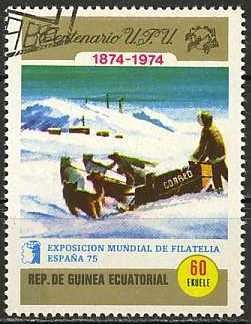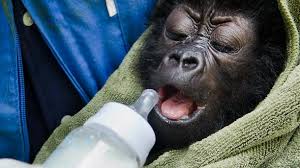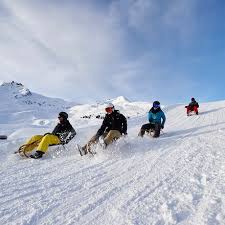Stamp: Postman in Sleigh (Equatorial Guinea 1974)
Postman in Sleigh (Equatorial Guinea 1974)
14 October (Equatorial Guinea ) within release 100 jaar Universal Postal Union goes into circulation Stamp Postman in Sleigh face value 60 Equatorial Guinean ekuele
| Stamp Postman in Sleigh in catalogues | |
|---|---|
| Michel: | Mi:GQ 461 |
| Yvert et Tellier: | Yt:GQ PA40B |
Stamp is vertical format.
Also in the issue 100 jaar Universal Postal Union:
- Stamp - Postman In Mountains face value 1.50;
- Stamp - Postman in Jungle face value 2.25;
- Stamp - Postman In China face value 2;
- Stamp - Postman In The Desert face value 35;
- Stamp - Postman in Sleigh face value 60;
Stamp Postman in Sleigh it reflects the thematic directions:
The Universal Postal Union (UPU, French: Union postale universelle) is a specialized agency of the United Nations (UN) that coordinates postal policies among member nations and facilitates a uniform worldwide postal system. It comprises 192 member states and is headquartered in Bern, Switzerland
Mammals are any vertebrates within the class Mammalia (/məˈmeɪli.ə/ from Latin mamma "breast"), a clade of endothermic amniotes distinguished from reptiles (including birds) by the possession of a neocortex (a region of the brain), hair, three middle ear bones and mammary glands. All female mammals nurse their young with milk, secreted from the mammary glands. Mammals include the largest animals on the planet, the great whales. The basic body type is a terrestrial quadruped, but some mammals are adapted for life at sea, in the air, in trees, underground or on two legs. The largest group of mammals, the placentals, have a placenta, which enables the feeding of the fetus during gestation. Mammals range in size from the 30–40 mm (1.2–1.6 in) bumblebee bat to the 30-meter (98 ft) blue whale. With the exception of the five species of monotreme (egg-laying mammals), all modern mammals give birth to live young. Most mammals, including the six most species-rich orders, belong to the placental group. The largest orders are the rodents, bats and Soricomorpha (shrews and allies). The next three biggest orders, depending on the biological classification scheme used, are the Primates (apes and monkeys), the Cetartiodactyla (whales and even-toed ungulates), and the Carnivora (cats, dogs, seals, and allies).
The domestic dog (Canis lupus familiaris or Canis familiaris) is a member of genus Canis (canines) that forms part of the wolf-like canids, and is the most widely abundant carnivore. The dog and the extant gray wolf are sister taxa, with modern wolves not closely related to the wolves that were first domesticated. The dog was the first domesticated species and has been selectively bred over millennia for various behaviors, sensory capabilities, and physical attributes. Their long association with humans has led dogs to be uniquely attuned to human behavior and they are able to thrive on a starch-rich diet that would be inadequate for other canid species. Dogs vary widely in shape, size and colours. Dogs perform many roles for people, such as hunting, herding, pulling loads, protection, assisting police and military, companionship and, more recently, aiding handicapped individuals. This influence on human society has given them the sobriquet "man's best friend".
A sled, skid, sledge, or sleigh is a land vehicle that slides across a surface, usually of ice or snow. It is built with either a smooth underside or a separate body supported by two or more smooth, relatively narrow, longitudinal runners similar in principle to skis. This reduces the amount of friction, which helps to carry heavy loads.
Animals are multicellular, eukaryotic organisms of the kingdom Animalia (also called Metazoa). All animals are motile, meaning they can move spontaneously and independently, at some point in their lives. Their body plan eventually becomes fixed as they develop, although some undergo a process of metamorphosis later on in their lives. All animals are heterotrophs: they must ingest other organisms or their products for sustenance.





